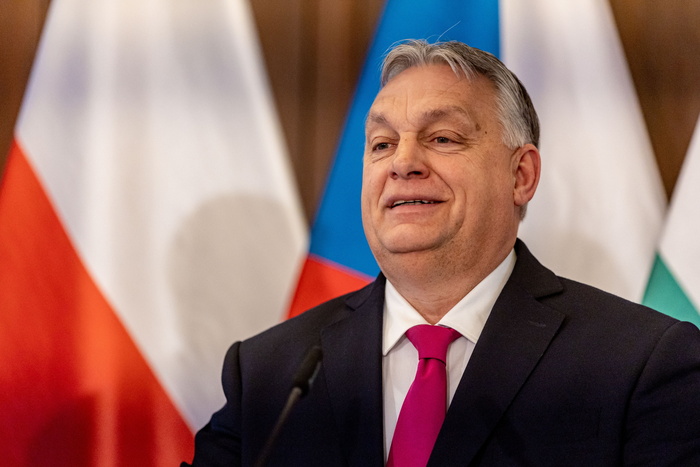The European Union has begun the search for formulas to circumvent the continued use, and in its opinion unjustified, of the right of veto in the common foreign policy by Hungary. The government of Viktor Orbán has taken that policy hostage, especially since his party, Fidesz, was forced to leave the European popular group. Budapest systematically vetoes the approval of any initiative of the High Representative for Foreign Policy of the EU, Josep Borrell, which prevents the Union from pronouncing unanimously on burning issues such as the violence in Gaza or the violation of fundamental freedoms in Hong Kong. Germany, the Union's largest partner, leads the supporters of supporting the Orbán Government, although all the sources consulted recognize that it will not be easy.
Coordination of European foreign policy has always been extremely complex because the Union Treaty generally provides for the use of unanimity. The 27 governments have also developed a culture of consensus and mutual respect so as not to interfere in an area as sensitive to national sovereignty as foreign policy. But that system of unanimity, points out a diplomatic source, "only works if all countries play constructively and without taking certain files as hostages for reasons totally unrelated to foreign policy."
That tacit cooperation agreement between European foreign ministers has been blown up in recent weeks by Hungary's obstructionism.
Since the approval of conclusions on China, Gaza or Lebanon, Budapest has hampered the application of sanctions against Belarus or the ratification of a new trade and development agreement with a group of African, Caribbean and Pacific countries.
More information
Orbán and Salvini launch a far-right alliance to compete with the European People's Party
Anonymous papers on the Balkans alert the EU
The attitude of the Orbán executive, according to community sources, is jeopardizing the efforts that have made it possible to develop, for better or for worse, an incipient common foreign and defense policy. In theory, the EU Treaty has a “gateway” that would allow the replacement of unanimity by qualified majority in foreign policy. But that jump must in turn be approved unanimously, which again gives Orbán the possibility of vetoing it.
Diplomatic sources indicate that "all possible options are being studied" to circumvent a use of the veto that they consider abusive and unjustified. The most recurrent formula, already used by Borrell on several occasions, is to approve the statements with the support of 26 of the 27 European governments, leaving a footnote of the Hungarian objection. "For the purposes of the international community, these texts remain as a declaration of the EU and the position of the Orbán government is obviated," says a European diplomat.
But more forceful options are also on the table, such as strictly applying the formulas provided for in the EU Treaty that allow the approval of certain foreign and defense policy decisions by a qualified majority.
The investigations already underway point to article 31 (foreign policy) and the section that regulates defense policy (articles 42 to 46).
Article 31 allows the approval by a qualified majority of “a decision establishing an action or a position of the Union based on a proposal presented by the High Representative of the Union for Foreign Affairs and Security Policy in response to a specific request that the Council European".
In defense, certain cooperations can also be developed by a qualified majority once they are launched.
Diplomatic sources acknowledge the difficulty of exploring these new paths "because one way or another always runs up against [the requirement of] unanimity." Countries always have the recourse to refer the decision to the European Council (where everyone has the right of veto), although for this they must invoke, according to the Treaty, "vital and explicit reasons of national policy", something that is not always evident in the Budapest locks.
The elevation to the European Council of a decision also increases the political price of maintaining the veto because it is not exercised in a technical or ministerial meeting, but in a European summit with the presence of all the leaders, including the German chancellor or the French president. . Orbán has already shown that in this forum he can come to terms with the reigning consensus, as at the summit on May 24, in which the tightening of sanctions against Belarus for the forced landing of a European passenger plane was quickly and unanimously agreed.
Pol Morillas, director of the Cidob study center (Barcelona Center for International Affairs) and co-author of a recent study on “the challenge of coherence” in European foreign policy, points out that the best way to circumvent vetoes “is to look for informal mechanisms integration in foreign policy ”.
Morillas recalls that Hungary could opt for a "constructive abstention", which allows the approval of certain decisions without the express participation of a country.
But given that this is not the case, the director of Cidob believes that it is possible to choose "to organize an outpost of countries in certain areas, with the possibility that the rest will join."
The researcher points out that this formula has been used successfully in the case of negotiations for the denuclearization of Iran.
The most powerful countries in the Union, led by Germany, do not seem willing, in any case, to accept the permanent boycott of foreign policy. Borrell, exasperated by the lack of willingness to reach consensus among delegations such as the Hungarian or Czech, has also recently warned the foreign ministers that the development of a common foreign and defense policy is not an option, but an obligation foreseen in the treaty.
The last straw for several partners came last week, when Hungarian representatives in Brussels prevented the adoption of a joint statement on the situation in Hong Kong. “Hungary has again blocked the EU declaration on Hong Kong. Three weeks ago he did it with the Middle East. The common foreign and security policy cannot function on the basis of a policy of blockade, ”Miguel Berger, Secretary of State for the German Government, thundered on Friday.
Berger added: "We need a serious debate on ways to manage dissent, including the use of qualified majority voting." Earlier, at the beginning of May, the German Foreign Minister, Heiko Maas, had launched a first volley by describing the Budapest veto on a statement condemning the events in Hong Kong as "absolutely incomprehensible".
The European External Action Service, led by Borrell, has “welcomed” Berlin's belligerent attitude, according to community sources. Brussels trusts that the pressure of the big capitals will stop the filibuster blockades of Hungary. But Pol Morillas warns that, with or without Budapest, "forging a common policy will be increasingly complicated because the number of partners has increased and also the differences on how to relate to the outside world." And he gives a recent example. "Some EU partners were very unhappy with Donald Trump, but others fully shared the political orientation of the former US president."

/cloudfront-eu-central-1.images.arcpublishing.com/prisa/NXYH3GVNTBEIZKRA4ZZ7KWDHJY.jpg)







